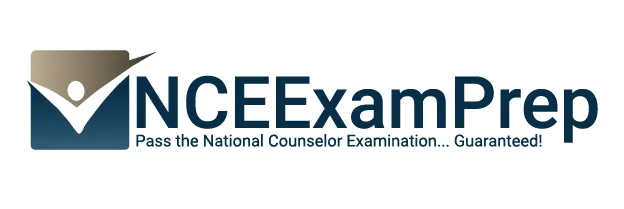Pass the National Counselor Examination...Guaranteed!

Practice Exams
Nearly 3000 unique questions with fully-explained answers.
UNLIMITED subject quizzes and full-length practice tests with your enrollment.

Lesson Videos
Recorded with a live group of students just like you preparing to pass the NCE. Lessons cover all content areas tested with application using practice exam questions.

Study Manual
Nearly 700 pages organized in 13 chapters in an outline format. Immediately downloadable for you to begin studying.
PASS ON YOUR FIRST TRY!
Guaranteed Study Package
A study package with a 20 year track record of helping students pass! Follow the Recommended Study Plan and if you still do not pass you are eligible for a full-refund!
Unlimited Practice Exams
PDF of the NCEExamPrep Study Manual
Library of Lesson Videos
Testing Clinic Videos
FREE NCE COACHING! (New!)

WHY CHOOSE NCEEXAMPREP?
OVER 20 YEARS OF HELPING TEST-TAKERS
PASS THE NCE WITH CONFIDENCE!
NCEExamPrep seeks to provide quality, reliable and easy to use preparation materials to help test-takers pass the National Counselor Examination with confidence!
QUALITY

Our study resources provide clear understanding of what you need to know. We are constantly updating the material to ensure that it is accurate, reflecting the most important information you will be tested on.
RELIABLE

You can trust that our preparation material focuses on the most up-to-date standards set by NBCC. We have made sure that you are prepared with the right measurements to ensure success!
EASY TO USE

Navigate through your learning content with ease. It's organized, nice to look at and simple to follow.
CONFIDENT

Preparing to pass the NCE with quality, reliable and easy to use material lessens anxiety and boosts your confidence. The best way to feel prepared to ACE your exam!

WHAT WE OFFER
OUR PRODUCTS
The full line of products can be found by clicking below. Downloadable products will be accessible immediately. When you purchase online content you will be enrolled in a course where you can watch videos or take practice exams. Physical products are shipped via USPS.

UNLIMITED
Access with Purchase

1,000+
Practice Exam Customers

50,000+
Practice Exams Completed

2,902
Unique Test Questions
What Are Our Customers Saying ?
Meet the Owner
Josh has the owner of NCEExamPrep since January 2020! Since then he has worked diligently to update the content and learning platform to ensure that customers feel confident that they are well prepared to pass the NCE!
Josh offers webinars and coaching as part of the NCEExamPrep study resource options and is always thrilled to hear back from customers when they get their passing score report from the NCE!
Josh also owns a private counseling practice in Temple, Texas where he treats high-conflict couples dealing with trauma, infidelity, trust-issues and other obstacles that leave them stuck.
Josh Kellar, LMFT, LPC


